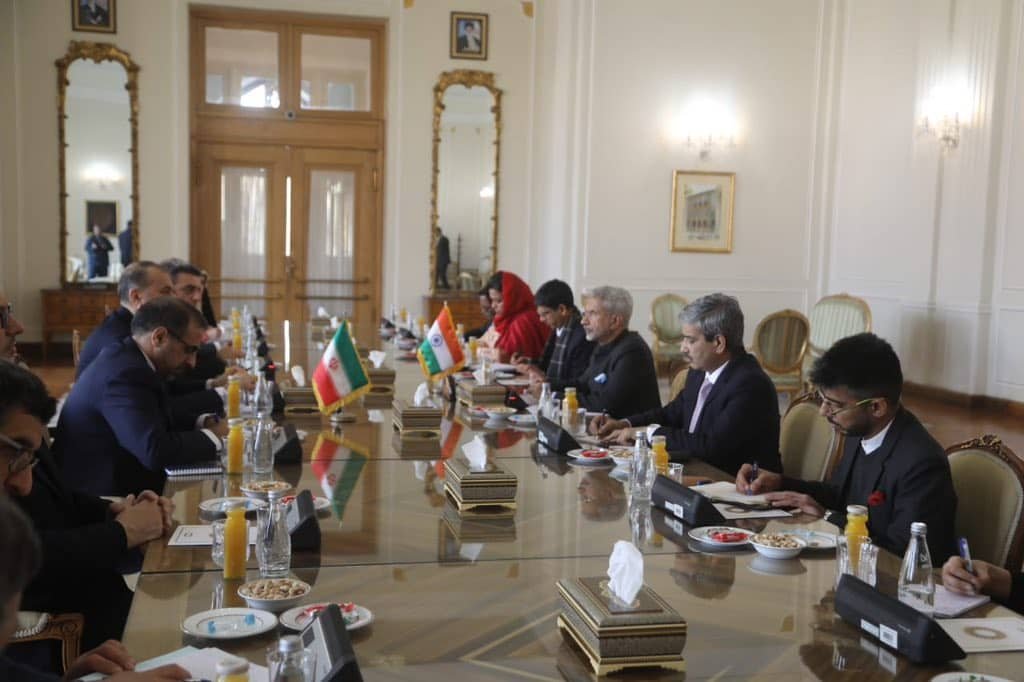Tehran, 16 January 2024(TDI): In a significant bilateral diplomatic encounter, the Foreign Minister of Iran received External Affairs Minister of India Subramanyam Jaishankar.
During the bilateral diplomatic talks, the two discussed recent regional and international developments, including the Israeli regime’s genocide and atrocities towards Palestinians.
Both sides also delved into the discussion of expanding bilateral and multilateral ties between the Shanghai Cooperation Organization and BRICS, the nature of strategic alliances, the development of the Chabahar Port, and the crucial role of the International North-South Transit Corridor (INSTC).
The International North-South Transport Corridor (INSTC) is a 7,200-kilometer multifaceted shipping goods project connecting India, Iran, Afghanistan, Armenia, Azerbaijan, Russia, Central Asia, and Europe.
Strategic Talks and Maritime Security
According to reports, as part of the ongoing high-level discussions, S. Jaishankar met with Iranian President Ebrahim Raisi.
He stated, “Hold wide-ranging discussions today in Tehran with Iranian Foreign Minister Hossein Amirabdollahian.”
“Our bilateral diplomatic talks focused on the long-term framework for India’s involvement with Chabahar Port and the INSTC connectivity project,” S. Jaishankar added.
Additionally, he remarked, “Other issues on the agenda were the Gaza situation, Afghanistan, Ukraine, and BRICS cooperation.”
Furthermore, he discussed the risks to marine transportation in the region, highlighting the importance of “quickly addressing” the issue in clear connection to the attack on commercial ships in the Red Sea by Iranian-backed Yemeni Houthi rebels during the Israel-Hamas battle.
During a joint press conference in Tehran, External Affairs Minister S. Jaishankar and Iran’s Foreign Minister Amirabdollahian discussed an increase in maritime transportation risks in the Indian Ocean as well as strikes near India.
Global Response to Military Strikes
In addition, Iranian Foreign Ministry spokesperson Nasser Kanani condemned the military strikes by the United States and the United Kingdom on Yemeni cities, labeling them arbitrary acts that violate international law and norms, as well as Yemen’s sovereignty and territorial integrity.
On top of that, the United States and the United Kingdom carried out additional airstrikes against Yemen’s Iran-backed Houthi rebels, who continue to attack international ships in the Red Sea.
Also Read: Iran condemns US and UK military strikes in Yemen
The Islamic Republic of Iran supports the Palestinian group Hamas in its fight with Israel, and Tehran condemns the US for supporting the actions it deems Israeli crimes in Gaza.
According to Amirabdollahian, Iran-backed Houthi fighters will continue their strikes in the Red Sea “as long as the genocide in the Gaza war continues.”
In contrast, India had been actively watching the situation in the Red Sea. Meanwhile, S. Jaishankar and US Secretary of State Antony Blinken discussed the issue over the phone on Thursday.
Ongoing Houthi Strikes and US Response
Regarding the airstrikes on Houthi sites, US President Joe Biden stated that he would not hesitate to take additional steps.
Additionally, US President Joe Biden declared Yemen’s Houthi militias a “terrorist” group on Friday after US and UK warplanes, submarines, and ships conducted dozens of air strikes across the country overnight.
“These strikes are in direct response to unprecedented Houthi attacks against international maritime vessels in the Red Sea, including the use of anti-ship ballistic missiles for the first time in history,” he added.
He further stated, “The response of the international community to these reckless attacks has been united and resolute.”

Iran’s Foreign Minister Hossein Amirabdollahian ended the diplomatic talks by emphasizing the importance of international water security for the Islamic Republic of Iran, claiming that the White House’s ongoing backing for Israeli war crimes prepares the path for regional instability to become widespread.
Aqsa Bibi is a contributing author on TDI



